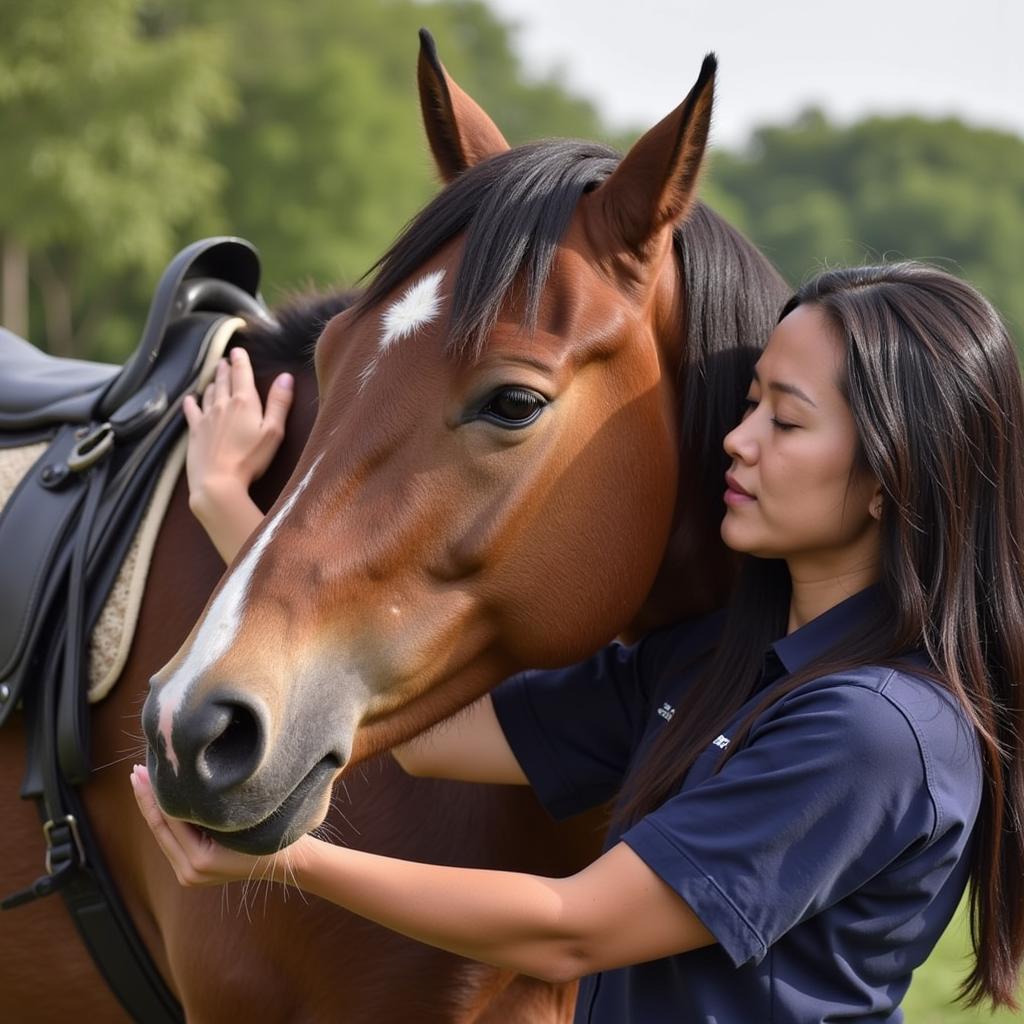The concept of a “Memory Horse” often evokes images of a steed perfectly recalling every trail, every command, and every experience. But what’s the reality behind this romanticized notion? This article delves into the fascinating world of equine memory, exploring the science, dispelling myths, and providing practical insights into how horses learn and remember.
How Horses Learn and Remember: A Deeper Look
Horses, like all animals, learn through a combination of instinct, conditioning, and experience. Their memory plays a crucial role in their survival, allowing them to recognize familiar places, identify herd members, and avoid potential dangers. A key component of equine learning is associative learning, where they connect specific stimuli with particular outcomes. For example, they quickly learn to associate the pressure of a rider’s leg with the cue to move forward. This type of learning is heavily reliant on repetition and reinforcement.
The Role of Repetition and Reinforcement in Equine Memory
Reinforcement, both positive and negative, strengthens the memory trace. A positive experience, such as receiving a treat after correctly executing a command, reinforces the desired behavior. Conversely, negative reinforcement, like the release of pressure from a bit when a horse yields to a rein aid, encourages compliance. Repetition further solidifies these learned associations, creating lasting memories.
Dr. Emily Carter, renowned equine behaviorist, explains, “Horses are incredibly adaptable creatures, and their memory is a testament to their ability to learn and adjust to their environment. Through consistent training and positive reinforcement, we can help them develop strong memories and build a trusting partnership.”
Myth vs. Reality: Do Horses Really Have “Photographic” Memories?
While horses possess impressive memories, the idea of them having perfect recall, often referred to as a “photographic memory,” is a misconception. They don’t remember every detail of every experience. Instead, they prioritize information relevant to their survival and well-being.
What Influences Equine Memory?
Several factors influence a horse’s ability to remember:
- Age: Younger horses are generally more receptive to new information and learn quickly. However, older horses, while potentially slower to acquire new skills, can retain learned behaviors for extended periods.
- Emotional State: A horse’s emotional state significantly impacts its ability to learn and remember. Fear, stress, or anxiety can hinder memory formation. Conversely, a calm and relaxed state promotes optimal learning.
- Training Methods: Consistent, positive reinforcement training methods are most effective in developing strong memories. Harsh or inconsistent training can create confusion and fear, impeding the learning process.
“Just like humans, horses learn and remember best when they are in a positive and supportive environment,” says Dr. Mark Johnson, an experienced equine veterinarian. “Building trust and rapport with a horse is essential for effective training and memory development.”
Practical Applications of Understanding Equine Memory
Understanding how horses learn and remember can significantly enhance our interactions with them. It enables us to tailor training methods to their individual needs and learning styles. horse simulator near me can be a valuable tool for practicing these skills. Whether teaching a new skill or addressing a behavioral issue, patience, consistency, and positive reinforcement are crucial for success.
Tips for Improving Your Horse’s Memory
- Keep training sessions short and focused. This prevents overload and helps maintain the horse’s attention.
- Break down complex tasks into smaller, manageable steps. This facilitates learning and builds confidence.
- Use positive reinforcement consistently. Reward desired behaviors with praise, treats, or a release of pressure.
- Create a calm and relaxed learning environment. Minimize distractions and ensure the horse feels safe and secure.
- Be patient and understanding. Learning takes time, and every horse learns at its own pace. horse memorial stone can serve as a lasting tribute to these magnificent creatures and the bond we share.
 Horse and trainer bonding session
Horse and trainer bonding session
Conclusion
The “memory horse” may be a romanticized concept, but the reality of equine memory is no less fascinating. By understanding the science behind how horses learn and remember, we can foster stronger bonds, enhance training effectiveness, and ensure their overall well-being. Remember that patience, consistency, and positive reinforcement are key to unlocking your horse’s full learning potential. mourning horse loss poems can be a source of comfort during difficult times.
FAQ
- Do horses have better memories than humans?
- How long can a horse remember something?
- Can horses remember traumatic experiences?
- What are some common memory-related problems in horses?
- How can I tell if my horse is struggling with its memory?
- Are there any supplements that can improve horse memory?
- What are some fun memory games I can play with my horse?
You might also be interested in learning about provence horse riding or exploring options for horse urns for human ashes.
For further assistance, please contact us: Phone: 0772127271, Email: [email protected] or visit our address: QGM2+WX2, Vị Trung, Vị Thuỷ, Hậu Giang, Việt Nam. Our customer service team is available 24/7.